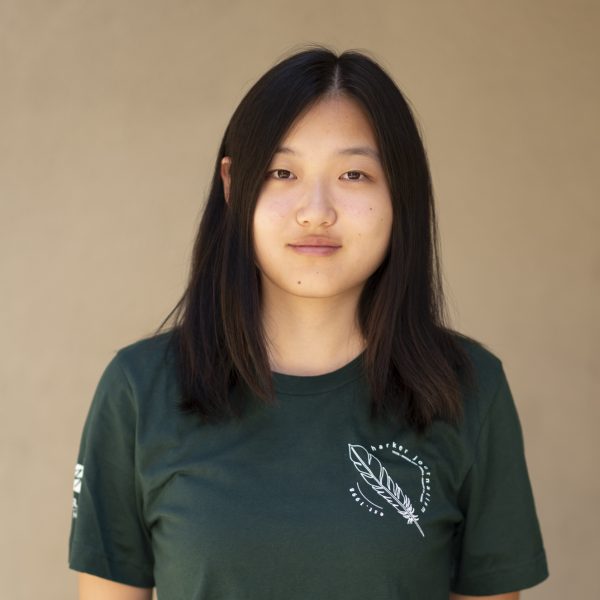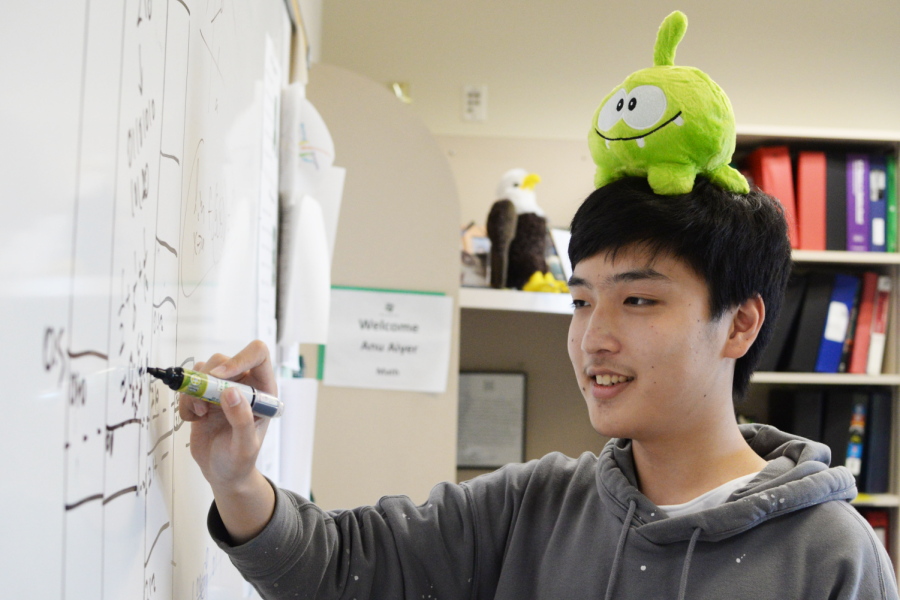Humans of Harker: Integrating interests
Stephen Xia expands his horizons and passes on his wisdom
“The journey of exploratory academics is supposed to be finding stuff you enjoy or trying something new. I want to be remembered for enjoying teaching, trying out history for the first time and finding out that I enjoyed it and as someone who enjoys sharing knowledge. Because just as I pass down what I know to the class of ‘24, ‘25, ‘26 and now ‘27 and ‘28, I want them to do the same for ‘29, ‘30 and ‘31,” Stephen Xia (12) said.
On a whiteboard at the front of the middle school math classroom, Stephen Xia (12) writes down four columns in red marker: Old, New, Extra, Schedule. Impending tasks, new ideas, possible initiatives and, of course, when everything should be done. Stephen explains each agenda item to a group of ten high school students, who listen intently, offer suggestions and note down their tasks.
Four months after this meeting, the Harker Math Invitational (HMI) will come to fruition, drawing over 250 middle school students from across the Bay Area and beyond. Stephen has been leading this project since his sophomore year, managing and assisting a team of high school volunteers in writing problems, designing activities and organizing logistics.
As somebody with considerable experience in competitive math, Stephen dedicates a significant portion of his time to mentoring and coaching younger students. Since ninth grade, he has coached groups of middle school students in Harker’s MathCounts team. For almost six months each year, he has devoted an afternoon a week to administering practice tests, which often contain problems that he wrote himself, and explaining solutions to the younger students.
“The middle schoolers are always so excited because they’re there because they want to be,” Stephen said. “You can see that they really want to be there, they want to learn, so you can share what you know, and then watch them do what they do. That’s very motivating.”
To effectively organize HMI and coordinate MathCounts training, Stephen works with Vandana Kadam, the middle school mathematics department chair and head coach of the MathCounts team. Kadam, who closely observes Stephen’s interactions with middle school students, admires his empathetic teaching approach and ability to adapt to the unique needs of each student.
“[Stephen is] very caring when he talks to the students,” Kadam said. “He does not make assumptions like ‘When I was in eighth grade I knew all of this, how come you guys don’t know this.’ He tries to explain things to the students in the best way he can. I find it very interesting because as a person standing in the front, he is quietly [leading the class].”
Stephen’s passion for passing on his knowledge extends to the upper school, where he serves as Math Club co-president. Upper school math teacher and Math Club adviser Dr. Anu Aiyer taught Stephen for the past two years and commended him on his aptitude as a student and his leadership in Math Club. She noted that Stephen can not only learn concepts thoroughly, but also clearly and effectively explain them to others, enabling them to understand the material as well.
“[Stephen excels in] two things: the ability to think clearly and the ability to explain as well,” Dr. Aiyer said. “Sometimes you can think and [a concept] makes sense to you, but then to be able to articulate that, whether it’s through words or writing it out, is also important.”
For Stephen, the vibrant math community he engages in has played an integral role in sustaining his love for the subject. Early on in high school, as he prepared for math contests by drilling problems for hours every day, he felt frustrated when he couldn’t see any substantial improvement in his skill level. However, engaging in math through various outlets, such as teaching younger students in MathCounts and collaborating with his peers in Math Club, motivated him through this difficult period.
“At some point, it was just like ‘Okay, why should I practice anymore? What’s the benefit I’ll get?’” Stephen said. “That’s part of the reason why some people find it unfathomable that people can enjoy math. Because at some point it can feel like just drills and that can get boring. Being able to participate in MathCounts, HMI, Math Club, all these different ways to do the same thing, suddenly made it more palatable [and] was really helpful in getting over that burnout.”
When Stephen did notice a marked improvement in his contest scores, he realized it wasn’t only because he had been practicing for extra hours, but also the result of other experiences. While not directly training him for math contests, the post-AP advanced topic math courses he took developed his problem-solving abilities. Further, by gaining exposure to different fields, from math to physics to history, Stephen has built a diverse and collective skill set, encompassing abilities such as critical thinking and effective communication, that he can apply across disciplines.
“[Those math classes] did help me because they’re developing these thinking skills,” Stephen said. “These ways of critical thinking, analysis, these skills that are all shared across disciplines — like learning calculus made understanding Physics 1 a lot easier. Without realizing, each of these different activities I’m involved in are all building upon each other.”
Close friend Anthony Tong (12) has observed that whether Stephen is leading a new Math Club initiative or learning the double bass after joining orchestra for the first time, he does so with focus and diligence, putting in his complete effort. One of Anthony’s favorite memories of Stephen is when, for his birthday last year, he took the time to hand-make a colorful card in the shape of a birthday cake slice which he filled with notes from his friends.
“That was junior year, and it was the second semester, and things were really busy so I was pretty anxious and everything,” Anthony said. “That day, they all rushed in, and it was really an amazing feeling. Words can’t really describe it. It’s really just realizing how much preparation, time they dedicated to doing it. He’s willing to dedicate time to his friends — you really see that from him.”
While Stephen has long engaged in the fields of science and math, in junior year he also decided to try out for Near Mitra, an upper school humanities research program. He discovered that he enjoyed delving into this new subject, but that it was also not entirely separate from what he had done in the past: skills he had gained from his science and math activities translated to historical research. Stephen aspires to instill in the next generation of students the value of taking academic risks and exploring new areas of study.
“The journey of exploratory academics is supposed to be finding stuff you enjoy or trying something new,” Stephen said. “I want to be remembered for enjoying teaching, trying out history for the first time and finding out that I enjoyed it and as someone who enjoys sharing knowledge. Because just as I pass down what I know to the class of ‘24, ‘25, ‘26 and now ‘27 and ‘28, I want them to do the same for ‘29, ‘30 and ‘31.”

Emma Gao (12) is a co-managing editor for Harker Aquila, and this is her fourth year on staff. This year, she hopes to explore writing a variety of articles...




![LALC Vice President of External Affairs Raeanne Li (11) explains the International Phonetic Alphabet to attendees. "We decided to have more fun topics this year instead of just talking about the same things every year so our older members can also [enjoy],” Raeanne said.](https://harkeraquila.com/wp-content/uploads/2025/10/DSC_4627-1200x795.jpg)


















![“[Building nerf blasters] became this outlet of creativity for me that hasn't been matched by anything else. The process [of] making a build complete to your desire is such a painstakingly difficult process, but I've had to learn from [the skills needed from] soldering to proper painting. There's so many different options for everything, if you think about it, it exists. The best part is [that] if it doesn't exist, you can build it yourself," Ishaan Parate said.](https://harkeraquila.com/wp-content/uploads/2022/08/DSC_8149-900x604.jpg)




![“When I came into high school, I was ready to be a follower. But DECA was a game changer for me. It helped me overcome my fear of public speaking, and it's played such a major role in who I've become today. To be able to successfully lead a chapter of 150 students, an officer team and be one of the upperclassmen I once really admired is something I'm [really] proud of,” Anvitha Tummala ('21) said.](https://harkeraquila.com/wp-content/uploads/2021/07/Screen-Shot-2021-07-25-at-9.50.05-AM-900x594.png)







![“I think getting up in the morning and having a sense of purpose [is exciting]. I think without a certain amount of drive, life is kind of obsolete and mundane, and I think having that every single day is what makes each day unique and kind of makes life exciting,” Neymika Jain (12) said.](https://harkeraquila.com/wp-content/uploads/2017/06/Screen-Shot-2017-06-03-at-4.54.16-PM.png)








![“My slogan is ‘slow feet, don’t eat, and I’m hungry.’ You need to run fast to get where you are–you aren't going to get those championships if you aren't fast,” Angel Cervantes (12) said. “I want to do well in school on my tests and in track and win championships for my team. I live by that, [and] I can do that anywhere: in the classroom or on the field.”](https://harkeraquila.com/wp-content/uploads/2018/06/DSC5146-900x601.jpg)
![“[Volleyball has] taught me how to fall correctly, and another thing it taught is that you don’t have to be the best at something to be good at it. If you just hit the ball in a smart way, then it still scores points and you’re good at it. You could be a background player and still make a much bigger impact on the team than you would think,” Anya Gert (’20) said.](https://harkeraquila.com/wp-content/uploads/2020/06/AnnaGert_JinTuan_HoHPhotoEdited-600x900.jpeg)

![“I'm not nearly there yet, but [my confidence has] definitely been getting better since I was pretty shy and timid coming into Harker my freshman year. I know that there's a lot of people that are really confident in what they do, and I really admire them. Everyone's so driven and that has really pushed me to kind of try to find my own place in high school and be more confident,” Alyssa Huang (’20) said.](https://harkeraquila.com/wp-content/uploads/2020/06/AlyssaHuang_EmilyChen_HoHPhoto-900x749.jpeg)



